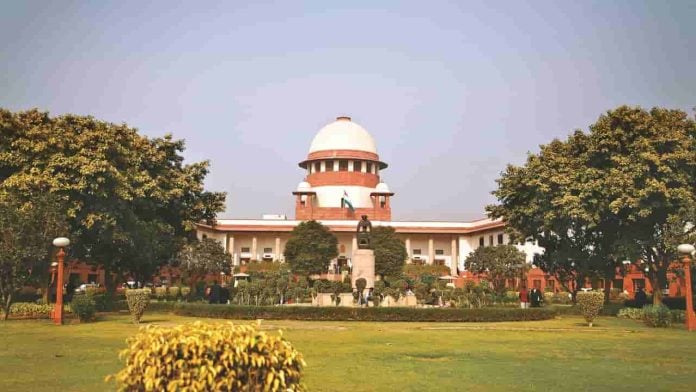The Supreme Court on Wednesday observed that the Central government’s legal powers to abrogate Article 370 should not be confused with any alleged abuse of process.
This observation was made by the Constitution Bench of Chief Justice of India (CJI) D.Y. Chandrachud, Justice Sanjay Kishan Kaul, Justice Sanjiv Khanna, Justice B.R. Gavai and Justice Surya Kant, while hearing the petitions challenging the abrogation of Article 370.
On August 5, 2019, the Central government had abrogated Article 370 in Jammu and Kashmir, revoking its special status. The Union of India brought in the Jammu and Kashmir Reorganisation Act, 2019 on the same day, which was passed by the Parliament within two days and received assent of the President on August 9, 2019. This resulted in bifurcation of the erstwhile state into two Union Territories – Jammu & Kashmir and Ladakh.
On the sixth day of hearing today, the Constitution Bench heard the arguments by Senior Advocate Rajeev Dhavan, who appeared for the J&K People’s Conference.
Dhavan contended that Article 370 gave the erstwhile state an internal sovereignty, which if denied, meant that the imposition of President’s Rule before the abrogation had failed in its purpose.
The Bench questioned the prospect of dealing with the validity of abrogation within the context of Article 356 (1) (c), which gave the President of India the power to suspend constitutional provisions when the constitutional machinery in a state has broken down.
Dhavan replied that the said proviso has to be read with the mandatory provisions under Article 3 (parliamentary procedure to form new states), since it gives the President wide-ranging powers.
He contended that during the President’s rule, Articles 3 and 4 could not be invoked as they had conditionality attached, and the conditionality lies with the state legislature. Here the legislature was Parliament and the Governor became the President, he added.
The Apex Court observed that such a broad proposition with respect to the two Articles might not be acceptable, as there might be situations that could not have been accounted for.
When the Senior Advocate stressed that Parliament could not have been substituted for the legislature of a state, as was done during the abrogation of Article 370, the top court of the country noted that there was a difference between the existence of power and its abuse, which should not be confused with.
The CJI, during the course of hearing, asked whether Parliament can pass a law when there was President’s Rule under Article 356, by resorting to Article 256 of the Constitution.
Dhavan replied that when the Parliament passed a law, it had to adhere to the conditionality of Articles 3 and 4 of the Constitution. He mentioned Article 168, stating that these were safeguards for the federal structure of the country. These were the limits for the Constitution in terms of federal structure, he added.
As per the Senior Counsel, the state was bifurcated into two UTs without any reference to Articles 239 or 239AA.
Asserting that Jammu and Kashmir was not a dead horse, Dhawan said the autonomy of a state could not be wished away like this just because the government said ‘okay,’ the provision was taken away.
Stating that the autonomy of a state was fundamental to the Indian Constitution, Dhawan argued that the Constitution had diverse provisions, which cannot just be done away with.
He gave the example of special constitutional provisions granting autonomy to certain states and regions in the North-East area of the country.
Asserting that Article 370 was part of the basic structure of the Constitution, Dhavan stressed that the Constitution could not be read like a statute.
He further said that Article 370 could not be invoked during the President’s Rule since it required the existence of a state legislature, adding that the J&K Reorganisation Act violated the process of Article 3.
Stating that degrading a state into a UT led to the loss of statehood, abolition of concurrence provisions and violation of residuary powers, the Senior Counsel asked the Apex Court to restore statehood to J&K and abrogate the President’s Rule.
This was followed by the submissions of Senior Advocate Dushyant Dave. He said Article 370 was a promise made regarding the special status, which could not have been breached at any point of time.
Calling Article 370 an unusual draughtsmanship, Dave said that it was temporary both by object and purpose. Once that purpose was sub-served, nothing remained for the President to exercise, he added.
As per Dave, constitutionalism would trump any ‘national interest’ argument urged by the Central government in favour of the abrogation.
He said that today, this decision (abrogation) was in the national interest, but the next decision may not be in the national interest. The Senior Advocate then requested the Apex Court to ‘step in’ and ‘lay down a law,’ so that the constitutionalism would come to play and this was not repeated anywhere else.
The Bench then directed the counsels for the petitioners to conclude their arguments by August 22.
The Union Home Ministry recently filed an affidavit before the Apex Court stating that after the abrogation of Article 370, Jammu and Kashmir has witnessed unprecedented stability and progress, with stone pelting and school closures becoming a thing of the past.
(Case title: In Re: Article 370 of the Constitution)


